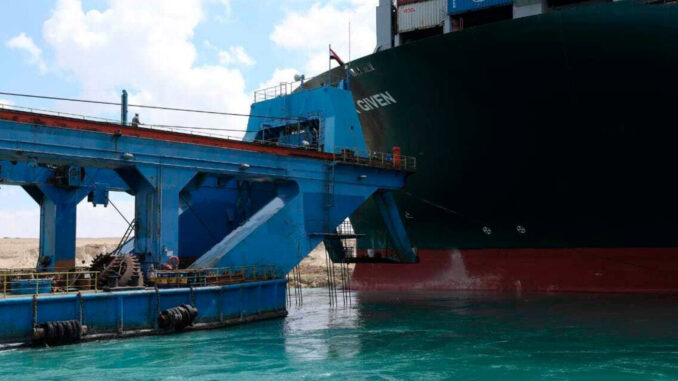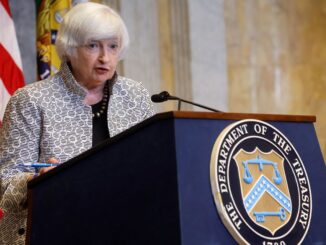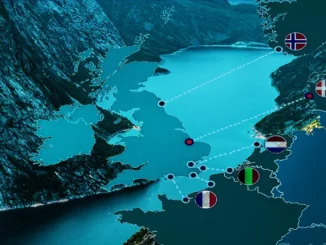
Energy News Beat Publishers Note: It is a great time to review our energy policies and think about the precarious we now find ourselves. We are no longer an energy exporter, but reliant on political rivals for oil products. The United States is not ready to divorce its self from oil and gas yet. While it is a great and lofty goal to be carbon net-zero we are not able to turn on a dime. We can print money that we do not have, and it will cause more problems than the movement to “green” energy.
A gust of wind was all it took to bring global container flows and oil shipments to a halt. The errant container ship that blocked the Suez canal this week has cut off a route that handles more than 10% of international trade.
But it’s also a reminder that even an advanced civilization like ours has points of acute vulnerability. In the strategy and military realm, such bottlenecks are also known as “choke points.” And we often don’t pay enough attention to them until something goes wrong.
The upshot is that governments are now more cognizant of the political and economic power held by those who control choke points. It’s one reason why the U.S. has big concerns about Huawei’s involvement in building critical 5G networks.
But first, back to canals. Our creator did a fine job with Planet Earth but if you were to nit-pick, she perhaps didn’t think enough about the needs of the shipping and oil industries. The Panama Canal (which connects the Atlantic and Pacific oceans), the Suez Canal (linking the Mediterranean and the Red Sea) and the Strait of Hormuz (at the mouth of the Persian Gulf) are places where container ships and oil tankers are forced to navigate narrow passages. The alternative is a long detour or more expensive air freight.
For decades these waterways have been recognized as areas of huge strategic importance and as being susceptible to military or terror attacks. Iran has frequently used the Strait of Hormuz to pressure foreign powers. Various back-up routes have been mooted but most haven’t materialized. Nicaragua pitched a canal linking the Pacific and Caribbean Sea, for example, but the rumored cost of $50 billion has been prohibitive.
One can perhaps excuse vulnerabilities arising from the natural world, but we should be less accepting of those in the economic sphere over which we have more control.
Consider energy. In seeking to rid itself of one pinch point — the fact that Europe gets much of its gas via pipelines that traverse Ukraine — Germany has created another: the twin Nord Stream gas pipelines that connect Russia and Germany under the Baltic Sea. The U.S. worries these will weaken eastern Europe and increase Germany’s dependence on Russia.
In the realm of finance, trillions of dollars of financial instruments are tied to the London interbank offered rate, which a small circle of banks found to be shockingly easy to manipulate until they were exposed in the years following the 2008 financial crisis. Libor is now being replaced. Similarly, Europe has long relied on the Swift payments system and the U.S. dollar, but that dependence came into question in 2018 as it disagreed with the U.S. over Iran sanctions.
In technology, people have warned for years that the U.S. needs a back-up for the Global Positioning System, the satellite-based navigation infrastructure that underpins much of the modern digital economy. The system can be spoofed or otherwise disrupted. It has yet to develop one.
Semiconductors are where the clearest pinch points are emerging. A global computer chip shortage during Covid has forced auto manufacturers to tear up production plans. The hiatus is temporary, but this belies the real problem: Very few companies are able to produce the most advanced chips, due to the technical challenges and vast cost of constructing foundries. The most important of these, Taiwan Semiconductor Manufacturing Co., is based on an island that’s under constant threat of invasion by Beijing.
It’s not the only example of this industry’s dangerous concentration: ASML Holding NV of the Netherlands has a monopoly on the machines needed to fabricate the best chips. Now China’s inability to buy the most cutting edge gear from ASML is holding back its own semiconductor ambitions.
None of these choke-point problems are easy to resolve. Not only are there geopolitical ambitions at work here, but there are also usually trade-offs between building greater resilience and efficiency. Reinforcing supply chains is expensive.
But because redundancy offers protection and is therefore a public good, there’s an argument that governments should play a role in providing it. Antitrust policy, for example, can be used to challenge monopolies and foster more competition.
Because having a back-up is pretty handy. You learn that when the roof falls in, or when a ship called the Ever Given snarls up the Suez Canal.



